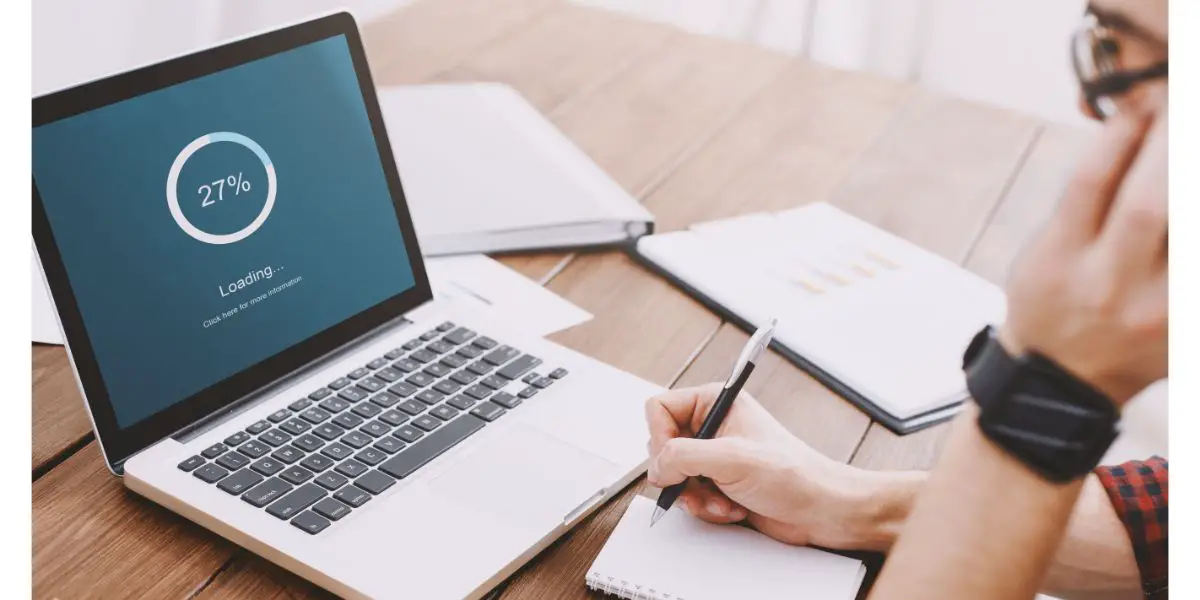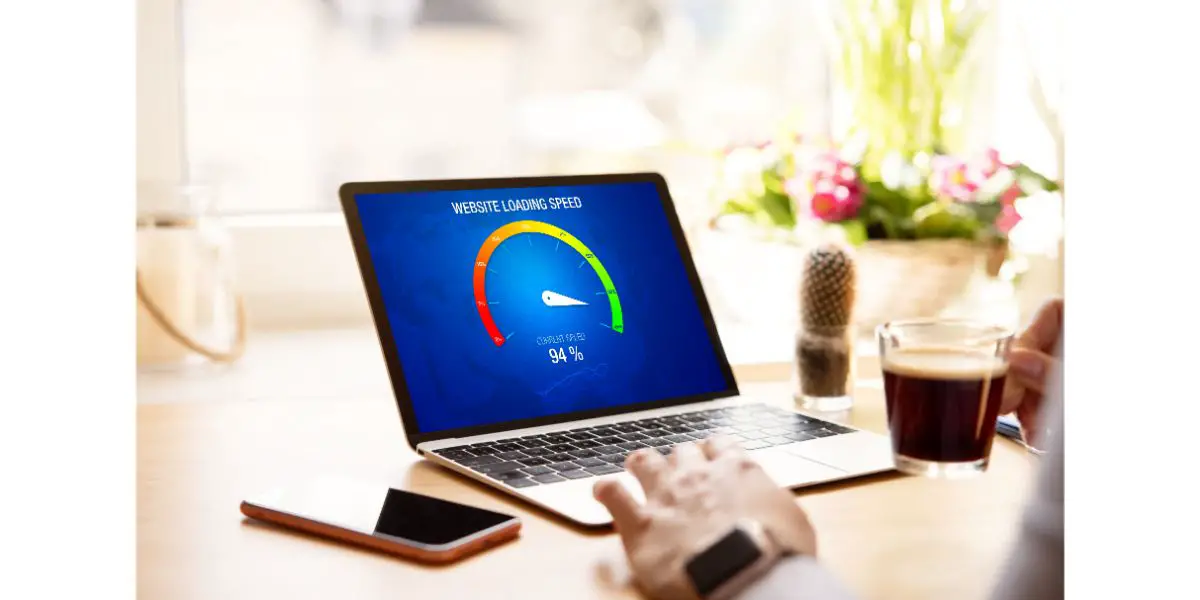Disclaimer: This post may contain affiliate links, meaning we get a small commission if you make a purchase through our links, at no cost to you. For more information, please visit our Disclaimer Page.
Is there anything worse than a laptop that slows to a crawl? Not only is this frustrating, but it becomes nearly impossible to do some tasks you need to handle with your computer. Find some common causes of a slow laptop and the best solutions.
Table of Contents
What are the Main Causes of a Slow Laptop? 10 Reasons
Modern laptops can accomplish tasks in almost a blink of an eye. So whether you want to play a new game with your online friends or edit some work for school, you don’t need to wait for the laptop to load and spend even more time waiting for it to save your progress. At least that’s what you think. But, unfortunately, there are dozens of reasons why your laptop is slow.
1. Lack of Hard Drive Space
One primary reason your laptop slows down is that it doesn’t have enough hard drive space. When you buy a new computer, you likely spend some time looking at specs to ensure you have enough memory. You might even think your new laptop had twice as much space as your old one. However, if you play games and often download files to your notebook, you’ll realize your new computer has limited space also.
Your laptop can also run slow because you don’t have enough RAM. Keep in mind that your computer uses room every time you use it. Not only does the OS need space to operate, but your laptop saves temporary files when you visit new websites and copies of old files.
Every file or folder on your computer takes up some of the valuable space it needs to run. You’ll likely have some speed problems if your hard drive is 95% full or more.
2. You Never Turn It Off
Do you use your laptop daily and close it rather than turning it off? You might think it’s good practice, but it could pose some problems for you later.
When you leave it on, your system runs several programs in the background. Have you ever tried to restart your computer and got a pop-up alert saying you needed to close a program first?
Anything that runs in the background reduces your available hard drive space and can cause your laptop to run slower than it should. Restarting your laptop also lets it look for any updates it can install to speed things up.
3. Browser Extensions
Browser extensions are a great way to customize your online experience. For example, with an ad blocker, you can visit all your favorite sites without seeing dozens of ads on the sides of each page. These blockers also keep videos from turning on automatically.
You might use a manager extension to keep track of all your passwords or a grammar checker that checks both your spelling and grammar. While browser extensions are helpful, running too many will slow down your laptop. Install only those you use every day.
4. Too Many Things
Most internet browsers let you open multiple tabs, which is handy when researching subjects or comparing products from different sites. Instead of bookmarking the tabs, you can leave them open as you browse these tabs.
In case you’re not aware of it, each tab uses some of your RAM. Those tabs also reduce your laptop’s memory and slow it down. Similar problems happen when you try to run multiple programs simultaneously. For example, keeping multiple tabs open to chat with a friend online, edit a document, play music, or watch a video will slow your laptop down.
5. Programs Use Your Power
Every time you buy a new laptop, it comes with some programs already installed. If you purchased one recently, you probably found that it came with some free trials of Microsoft software together with at least one browser.
Many laptops also have a game center that lets you play several games for free. Unfortunately, they take up valuable space and pull resources away from the programs you download. You may even find that they run in the background without your permission until you shut them off. Getting rid of them can solve the issue.
6. Apps Running at Startup
When you download new apps to your laptop, you probably don’t take time to read through the terms of service. However, there’s a good chance that one of those terms will state that the app begins running as soon as you turn your computer on.
While you can run a few apps at startup without trouble, you will have some issues if you allow multiple apps to open as soon as your laptop runs. Those apps take necessary resources away from your notebook and can slow it down.
7. Crypto Mining
Crypto mining is hot right now. While Bitcoin is still the most popular option, there are other types of currency you can mine with a computer. The biggest issue is that mining requires a lot of resources. That is why most people set up a separate system dedicated to mining.
If you use your laptop for mining, it might run slowly. When you download a new file, it can contain malware that hides inside one of your folders. The malware runs a script that uses your resources to find crypto online.
8. Malware
All forms of malware are dangerous and can slow down your laptop. Never click any link that arrives in your inbox, even if it looks like it comes from a reputable website such as your bank.
Use caution when visiting websites and downloading anything. All it takes is one game for malware to infect your laptop. With adware, you see ads every time you go online.
Spyware gives hackers remote access to your system. Ransomware allows others to hijack your laptop and hold it for ransom. Other forms of malware can corrupt some of your files and limit your speed.
9. Too Much Debris
Did you know that solid debris can make your laptop slow? Of course, you know all about the dangers of spilling drinks on your keyboard, but you may not realize how much damage your environment can do.
If you work in a dusty room, the air can force dust into your laptop, which blocks its vents. When you use programs that need a lot of power, the vents help hot air escape and keep your laptop running at high speed. Unfortunately, dust buildup can slow it down. Smoke and pet hair can cause similar problems.
10. Hard Drive Failure
The drive itself may fail even if you have plenty of space on your hard drive. However, before it fails, you should notice that your laptop is running slower than before. Some hard drives start showing damage after three years of regular use.
Others start to show signs of wear after five to seven years. For example, the hard drive may slow down your OS because it can no longer read all the files needed. You may also discover that the hard drive doesn’t have enough space to run some of your programs.
Avoid Computer Scams
A slow laptop can drive you crazy. Feeling frustrated, you might try to find fast solutions that save you time and money, leaving you vulnerable to common scams. Look at some of the more popular scams before you check out all of our solutions to improve your laptop’s speed.
Remote Access
The remote access scam is one that you’ll often come across online. It usually requires that you call a toll-free number for help. Once the scammer gets you on the phone, they will claim that you need to download a program to improve your speed.
When you download and open the software, it gives the scammer remote access to your laptop. Beware of anyone who calls claiming that they detected a problem with your computer and can help you fix it, too.
Internet Speed Test
Google offers a helpful internet speed test you can use for free. You only need to search for the test and run it. Within seconds, you’ll find out your download and upload speeds. Aside from Google, some ISP offer speed tests. Notable ones would be Spectrum, AT&T, and Xfinity. All these tools do not require any downloads and can run in a browser.
It helps you decide if you need to talk with your ISP. Similar tests claim that they can check your laptop’s speed. They often take the form of apps or programs you download to perform a speed test.
You’ll also find websites that claim they let you do tests for free. You give the site permission to access your computer when you click on the button. Both the websites and apps provide individual remote access to your laptop.
If you come across sites such as this, do not continue! No reputable speed tests will require access to your computer to run tests.
9 Solutions for Slow Laptops
A slow laptop is almost a waste of time. It isn’t fast enough for your favorite games and may take a long time when you try to do some work or watch a video. You don’t need to stick with a slow laptop, though, because there are a handful of solutions you can try.
1. Free Up Space
Freeing up some space makes your laptop run faster. Now is an excellent time to review your folders and files to find data you no longer need. You can move each to your recycling bin and then empty it to gain more space.
Look for external storage if you need to keep more files than you delete. A USB or thumb drive is a good option for those on the go because it doesn’t take up much space and has tons of room. Consider an external hard drive if you have many files you want to save. External hard drives are easy to use and can hold up to 8TB of data or more.
2. Make Use of Updates
Is there anything worse than getting a message while watching a movie or playing a game that you need to update your system? While it’s a pain, it’s also a task you must do to keep your laptop running correctly.
Use the Windows menu to enter your Settings. Then, click on the Update & Security section to choose the option for automatic updates. Use this button to find out if Windows released any updates you still need to install. While it can take a few hours or more to update your laptop, it also helps your system run faster.
3. CTRL, ALT, DLT
An easy way to make your laptop run faster is with the Control, Alt, Delete option. Pressing those buttons will bring up the Task Manager. It lets you close an app or program when it stops responding.
Bring up the Task Manager and look for anything unfamiliar you see. Pay special attention to apps that contain a random combo of letters, as these are often unnecessary apps or malware. Then, close all of those apps.
You can also use this process to see what programs/apps use most of the space on your hard drive. Then, delete what you don’t need anymore.
4. Delete Temporary Files
Whenever you use your laptop, it saves temporary files to your hard drive. If you spend a lot of time online, those files relate to the sites you visit and anything you download.
When you use editing software and other programs, your laptop retains temporary files of your past work. You may find that you can restore a previous version of a file you lost from the temporary file.
These files take up some of your hard drive space and slow down your laptop. Windows Disk Cleanup lets you run a quick scan and delete any temporary files. You can also search for those files and manually delete them.
5. Use Anti-Virus Software
Don’t use your laptop with an internet connection unless you have anti-virus software installed. This software lets you know before you visit a website that contains dangerous material. It also scans your emails and any links you find on a site to let you know if those links are safe.
Using anti-virus software also allows you to perform regular checks or scans of your system and find malware that slows things down. It’s helpful to run a new scan at least once a month. However, you may want to check your laptop once a week.
6. Change Your Power Settings
Windows laptops come with specific settings that make it easier for you to use your new computer. For example, the Balanced option is the default setting that reduces how much your laptop uses energy.
It is not always the best choice, though, especially if you run programs that require a lot of power. Instead, try switching to the High-Performance option. Though it does consume more energy as you use your laptop, it will also help with your speed.
7. Keep Your Laptop Cool
A laptop that runs too hot slows down. Using a laptop cooler is just one option. Most models look like pads with fans across the top.
You can choose one that works with a USB cord or plugs into the wall. Setting your laptop on top of the cooler sends air through the vents to blow out dust and bring down the internal temperature.
You need also need to clean your laptop regularly. A computer vacuum helps you remove any solid debris from between the keys and stuck to your vents.
8. Get Rid of Programs
No one would blame you for having a few apps or programs that you no longer need on your laptop. Have you ever downloaded a game you thought you would love but only played it a few times? It’s easy to forget the game and leave it tucked away in a folder.
To make your laptop run faster, delete any programs you don’t need. Go into your Control Panel to the Programs and then Programs & Features. When you click on the program’s name, you can select the delete option to remove it from your laptop.
9. Turn Off Startup Programs
As we explained above, some programs on your laptop launch at startup and can slow things down right off the bat. Removing or disabling those programs can improve your laptop’s speed.
Open your Task Manager and click on the Startup section. It shows you the name of each program, its publisher, its status, and its startup impact. Pay special attention to those with a high impact and disable them.
To disable the program, click on its name and the Disable button at the bottom of the window. Disabling all the apps and programs that run during startup may improve its overall speed.
Conclusion
Looking at why your laptop is so slow is an excellent way to find out what causes your problem and the best way to fix it. All these solutions help you improve your laptop speed quickly.



